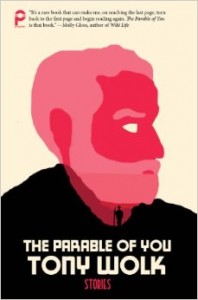The Parable of You by Tony Wolk
 The Parable of You
The Parable of You
by Tony Wolk
Propeller Books, November 2013
90 pages / $12 Buy from Propeller Books or Amazon
The 17 stories in the 90-page The Parable of You feel like vignettes in the true sense of the word.
“The Nameless Ones”: A purposefully obscure Cinderella figure doesn’t wake up one day. The narrator arrives to wake her from her slumber. The story ends.
“The Shipwrecked Sailor”: The story’s namesake finds a house with a small door on an otherwise abandoned island. He enters, and finds that the contents of the room he has stepped into shift and disappear. The story ends.
“The Jogger”: Abraham Lincoln sets out on a run. He reflects on “The first time ever that he had traded Vulcan’s boots for the moccasins of Mercury and took to the countryside.” The story ends
At first I was a little hard on these stories. I used my newly acquired workshop language to diagnose them: “Not fully realized,” I penned in my notebook. “Linguistically cumbersome.” But the stories toward the end of the collection began to win me over. In “The Minkfarm,” for example, a young narrator visits a fur-coat farm with his reticent father. It is a longer story, relative to the rest of Parable, and by the end the boy watches a horse tied to a series of posts and shot.
I saw the horse shudder and go limp, its head slack. The four ropes kept it from falling. Then, with the shot still reverberating in the nearby trees, I realize that father’s hand was on my shoulder, gripping me tightly, holding me close.
This is good stuff, and fully realized indeed. It is just approached from the side, through the point of view of a man who now has his own children, thinking about his own childhood. A different writer might just tell the story. Tony Wolk doesn’t. He weaves a frame for the nostalgia, a specific man on a specific night—“the half-moon is waxing”—to recall the substance of the story. It is only a paragraph on either side of the piece that provides this frame. Still, such insertions are strange to see. It is not out of necessity that Wolk has written them. It is out of something else.
What I’ve come to understand is that, instead of being not-good, The Parable of You reads like literature in translation. The feeling I had in reading Wolk is similar to how I felt when I read Cortázar’s Hopscotch for the first time, and his Historias de cronopios y famas (the latter of which I made the mistake of trying to read in Spanish): as if I had encountered something very interesting and probably great, but didn’t quite have the tools or cultural logic to appreciate it for what it was.
There even seem to be different conventions here in the choice of subjects. Like Wolk’s three novels in the last ten years about a time-traveling Abraham Lincoln, two stories in the collection take on Abe as their subject. It’s almost like some weird American fetishism, except for the fact that it’s undertaken by an American. It seems wildly uncool to me to write prospectively indie fiction about the namesake of one of Bill O’Reilly’s most recent books, but I can’t imagine that Wolk cares much at all.
Even the title of his collection seems bizarrely straightforward and genuine. This is not what we expect from a young, indie press in Portland. But the story that gives The Parable of You its name is an awesome one, based on the problem of the drunken sailors. It ends with the spatial equivalent of Shakespeare’s typewriting monkey: even if you’re set out, blindfolded, to wonder the universe forever, you will eventually make your way back to the lightpost where you began. The story, and the book, end:
Your hand traces the familiar scoring, the X, the series of grooves, your name. You remove the blindfold. You are on the corner again. The universe is finite. In time, you will always come home. Always.
December 27th, 2013 / 12:00 pm
